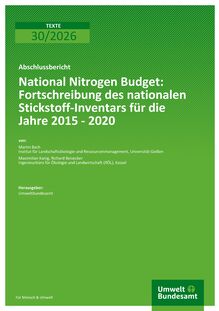
National Nitrogen Budget: Fortschreibung des nationalen Stickstoff-Inventars für die Jahre 2015 - 2020
Texte / February 2026 / 180 pages

Sustainability and environmental problems usually have a wide range of causes, and they are often global. Solutions must therefore be found at international level. International cooperation in environmental protection has gradually become a more important issue over the last two decades. UBA's most important target groups are EU and UN institutions, the OECD and the countries of Central and Eastern Europe. The German National Sustainability Strategy is particularly relevant for German sustainability policies. UBA exercises foresight to develop strategies to influence developments in the long term and with due regard for processes and resources.